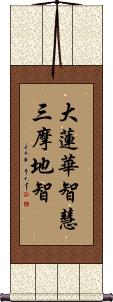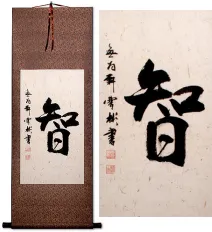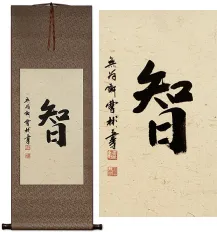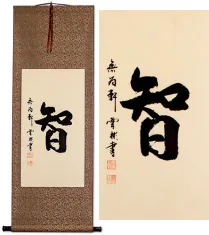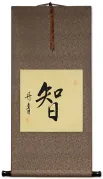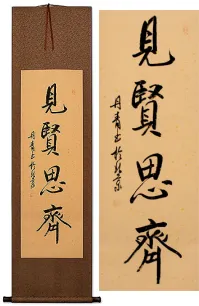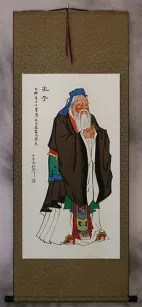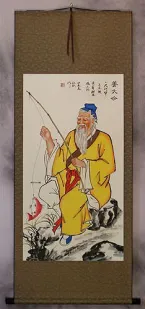Many custom options...
And formats...

Samadhi Wisdom in Chinese / Japanese...
Buy a Samadhi Wisdom calligraphy wall scroll here!
Great Lotus Wisdom - Samadhi Wisdom
This in-stock artwork might be what you are looking for, and ships right away...
Gallery Price: $150.00
Your Price: $78.88
Gallery Price: $150.00
Your Price: $78.88
Gallery Price: $65.00
Your Price: $39.88
Gallery Price: $100.00
Your Price: $49.88
Gallery Price: $61.00
Your Price: $33.88
Gallery Price: $61.00
Your Price: $33.88
Gallery Price: $61.00
Your Price: $33.88
Gallery Price: $61.00
Your Price: $33.88
Not the results for samadhi wisdom that you were looking for?
Below are some entries from our dictionary that may match your samadhi wisdom search...
| Characters If shown, 2nd row is Simp. Chinese |
Pronunciation Romanization |
Simple Dictionary Definition |
力 see styles |
lì li4 li ryoku りょく |
More info & calligraphy: Power / Strength(suffix) strength; power; proficiency; ability; (given name) Riki bala; power, strength, of which there are several categories: 二力 power of choice and of practice; 三力 the power of Buddha; of meditation (samādhi) and of practice. 五力 pañcabala, the five powers of faith, zeal, memory (or remembering), meditation, and wisdom. 六力 A child's power is in crying; a woman's in resentment; a king's in domineering; an arhat's in zeal (or progress); a Buddha's in mercy; and a bhikṣu's in endurance (of despite) . 十力 q.v. The ten powers of Buddhas and bodhisattvas. |
大蓮華智慧三摩地智 大莲华智慧三摩地智 see styles |
dà lián huá zhì huì sān mó dì zhì da4 lian2 hua2 zhi4 hui4 san1 mo2 di4 zhi4 ta lien hua chih hui san mo ti chih dai renge chie sanmajichi |
More info & calligraphy: Great Lotus Wisdom - Samadhi Wisdom |
五智 see styles |
wǔ zhì wu3 zhi4 wu chih gochi ごち |
(place-name, surname) Gochi The five kinds of wisdom of the 眞言宗 Shingon School. Of the six elements 六大 earth, water, fire, air (or wind), ether (or space) 曇空, and consciousness (or mind 識 ), the first five form the phenomenal world, or Garbhadhātu, the womb of all things 胎藏界, the sixth is the conscious, or perceptive, or wisdom world, the Vajradhātu 金剛界, sometimes called the Diamond realm. The two realms are not originally apart, but one, and there is no consciousness without the other five elements. The sixth element, vijñāna, is further subdivided into five called the 五智 Five Wisdoms: (1) 法界體性智 dharmadhātu-prakṛti-jñāna, derived from the amala-vijñāna, or pure 識; it is the wisdom of the embodied nature of the dharmadhātu, defined as the six elements, and is associated with Vairocana 大日, in the centre, who abides in this samādhi; it also corresponds to the ether 空 element. (2) 大圓鏡智 adarśana-jñāna, the great round mirror wisdom, derived from the ālaya-vijñāna, reflecting all things; corresponds to earth, and is associated with Akṣobhya and the east. (3) 平等性智 samatā-jñāna, derived from mano-vijñāna, wisdom in regard to all things equally and universally; corresponds to fire, and is associated with Ratnasaṃbhava and the south. (4) 妙觀察智 pratyavekṣaṇa-jñāna, derived from 意識, wisdom of profound insight, or discrimination, for exposition and doubt-destruction; corresponds to water, and is associated with Amitābha and the west. (5) 成所作智 kṛtyānuṣṭhāna-jñāna, derived from the five senses, the wisdom of perfecting the double work of self-welfare and the welfare of others; corresponds to air 風 and is associated with Amoghasiddhi and the north. These five Dhyāni-Buddhas are the 五智如來. The five kinds of wisdom are the four belonging to every Buddha, of the exoteric cult, to which the esoteric cult adds the first, pure, all-refecting, universal, all-discerning, and all-perfecting. |
父母 see styles |
fù mǔ fu4 mu3 fu mu fubo(p); chichihaha; tetehaha(ok); kazoiroha(ok); bumo(ok); kazoiro(ok) ふぼ(P); ちちはは; ててはは(ok); かぞいろは(ok); ぶも(ok); かぞいろ(ok) |
father and mother; parents father and mother; parents; (surname) Fubo pitṛ-mātṛ, father and mother, parents; 無明 ignorance is referred to as father, and 貪愛 desire, or concupiscence, as mother, the two— ignorance and concupiscence— being the parents of all delusion and karma. Samādhi is also referred to as father, and praj na (wisdom) as mother, the parents of all knowledge and virtue. In the vast interchanges of rebirth all have been or are my parents, therefore all males are my father and all females my mother: 一切男女我父母 see 心地觀經 2. |
三昧魔 see styles |
sān mèi mó san1 mei4 mo2 san mei mo zanmai ma |
samādhi-māra, one of the ten māras, who lurks in the heart and hinders progress in meditation, obstructs the truth and destroys wisdom. |
胎藏界 see styles |
tāi zàng jiè tai1 zang4 jie4 t`ai tsang chieh tai tsang chieh taizō kai |
Garbhadhātu, or Garbhakośa-(dhātu), the womb treasury, the universal source from which all things are produced; the matrix; the embryo; likened to a womb in which all of a child is conceived— its body, mind, etc. It is container and content; it covers and nourishes; and is the source of all supply. It represents the 理性 fundamental nature, both material elements and pure bodhi, or wisdom in essence or purity; 理 being the garbhadhātu as fundamental wisdom, and 智 acquired wisdom or knowledge, the vajradhātu. It also represents the human heart in its innocence or pristine purity, which is considered as the source of all Buddha-pity and moral knowledge. And it indicates that from the central being in the maṇḍala, viz. the Sun as symbol of Vairocana, there issue all the other manifestations of wisdom and power, Buddhas, bodhisattvas, demons, etc. It is 本覺 original intellect, or the static intellectuality, in contrast with 始覺 intellection, the initial or dynamic intellectuality represented in the vajradhātu; hence it is the 因 cause and vajradhātu the 果 effect; though as both are a unity, the reverse may be the rule, the effect being also the cause; it is also likened to 利他 enriching others, as vajradhātu is to 自利 enriching self. Kōbō Daishi, founder of the Yoga or Shingon 眞言 School in Japan, adopted the representation of the ideas in maṇḍalas, or diagrams, as the best way of revealing the mystic doctrine to the ignorant. The garbhadhātu is the womb or treasury of all things, the universe; the 理 fundamental principle, the source; its symbols are a triangle on its base, and an open lotus as representing the sun and Vairocana. In Japan this maṇḍala is placed on the east, typifying the rising sun as source, or 理. The vajradhātu is placed west and represents 智 wisdom or knowledge as derived from 理 the underlying principle, but the two are essential one to the other, neither existing apart. The material and spiritual; wisdom-source and intelligence; essence and substance; and similar complementary ideas are thus portrayed; the garbhadhātu may be generally considered as the static and the vajradhātu as the dynamic categories, which are nevertheless a unity. The garbhadhātu is divided into 三部 three sections representing samādhi or quiescence, wisdom-store, and pity-store, or thought, knowledge, pity; one is called the Buddha-section, the others the Vajra and Lotus sections respectively; the three also typify vimokṣa, prajñā, and dharmakāya, or freedom, understanding, and spirituality. There are three heads of these sections, i. e. Vairocana, Vajrapāṇi, and Avalokiteśvara; each has a mother or source, e. g. Vairocana from Buddha's-eye; and each has a 明王 or emanation of protection against evil; also a śakti or female energy; a germ-letter, etc. The diagram of five Buddhas contains also four bodhisattvas, making nine in all, and there are altogether thirteen 大院 or great courts of various types of ideas, of varying numbers, generally spoken of as 414. Cf. 金剛界; 大日; 兩部. |
佛具十身 see styles |
fó jù shí shēn fo2 ju4 shi2 shen1 fo chü shih shen butsugu jūshin |
The ten perfect bodies or characteristics of Buddha: (1) 菩提身 Bodhi-body in possession of complete enlightenment. (2) 願身 Vow-body, i.e. the vow to be born in and from the Tuṣita heaven. (3) 化身 nirmāṇakāya, Buddha incarnate as a man. (4) 住持身 Buddha who still occupies his relics or what he has left behind on earth and thus upholds the dharma. (5) 相好莊嚴身 saṁbhogakāya, endowed with an idealized body with all Buddha marks and merits. (6) 勢力身 or 心佛 Power-body, embracing all with his heart of mercy. (7) 如意身 or 意生身 At will body, appearing according to wish or need. (8) 福德身 or 三昧身 samādhi body, or body of blessed virtue. (9) 智身 or 性佛 Wisdom-body, whose nature embraces all wisdom. (10) 法身 dharmakāya, the absolute Buddha, or essence of all life. |
文殊三昧 see styles |
wén shū sān mèi wen2 shu1 san1 mei4 wen shu san mei Monju zanmai |
The samādhi of Mañjuśrī styled the 無相妙慧 formless wonderful wisdom, or wonderful wisdom in the realm of that which is beyond form. |
五佛羯磨印 see styles |
wǔ fó jié mó yìn wu3 fo2 jie2 mo2 yin4 wu fo chieh mo yin gobutsu konma in |
The manual signs by which the characteristic of each of the Five Dhyāni-Buddhas is shown in the Diamond-realm group, i. e. Vairocana, the closed hand of wisdom; Akṣobhya, right fingers touching the ground, firm wisdom; Ratnasaṃbhava, right hand open uplifted, vow-making sign; Amitābha, samādhi sign, right fingers in left palm, preaching and ending doubts; and Amoghasiddhi, i. e. Śākyamuni, the karma sign, i. e. final nirvana. These mūdra, or manual signs, are from the 瑜祇經 but other forms are common. |
十八不共法 see styles |
shí bā bù gòng fǎ shi2 ba1 bu4 gong4 fa3 shih pa pu kung fa jūhachi fugū hō |
the eighteen distinctive characteristics as defined by Hīnayāna are his 十力, 四無畏, 三念住 and his 大悲; the Mahāyāna eighteen are perfection of body; of speech; of memory; impartiality or universality; ever in samādhi; entre self-abnegation; never diminishing will (to save); zeal; thought; wisdom; salvation; insight into salvation; deeds and mind accordant with wisdom; also his speech; also his mind; omniscience in regard to the past; also to the present; and to the future.; āveṇikadharma, or buddhadharma, the eighteen different characteristics of a Buddha as compared with bodhisattvas, i.e. his perfection of body (or person), mouth (or speech), memory, impartiality to all, serenity, self-sacrifice, unceasing desire to save, unfagging zeal therein unfailing thought thereto, wisdom in it, powers of deliverance, the principles of it, revealing perfect wisdom in deed, in word, in thought, perfect knowledge of past, future, and present, v. 智度論 26. |
大妙金剛大甘露軍拏利焰鬘熾盛佛頂經 大妙金刚大甘露军拏利焰鬘炽盛佛顶经 see styles |
dà miào jīn gāng dà gān lù jun ná lì yàn mán chì chéng fó dǐng jīng da4 miao4 jin1 gang1 da4 gan1 lu4 jun1 na2 li4 yan4 man2 chi4 cheng2 fo2 ding3 jing1 ta miao chin kang ta kan lu chün na li yen man ch`ih ch`eng fo ting ching ta miao chin kang ta kan lu chün na li yen man chih cheng fo ting ching Daimyō kongō dai kanro Kundari Emman shijō bucchō kyō |
Sūtra of the [Yiqie] Foding [zhuanlun wang], who enters the violently blazing [samādhi] of the great wonderful King of Wisdom Amṛta Kundalî |
The following table may be helpful for those studying Chinese or Japanese...
| Title | Characters | Romaji (Romanized Japanese) | Various forms of Romanized Chinese | |
| Great Lotus Wisdom - Samadhi Wisdom | 大蓮華智慧三摩地智 大莲华智慧三摩地智 | dai renge chie sanmajichi dairengechiesanmajichi | dà lián huá zhì huì sān mó dì zhì da4 lian2 hua2 zhi4 hui4 san1 mo2 di4 zhi4 da lian hua zhi hui san mo di zhi | ta lien hua chih hui san mo ti chih |
| In some entries above you will see that characters have different versions above and below a line. In these cases, the characters above the line are Traditional Chinese, while the ones below are Simplified Chinese. | ||||
Successful Chinese Character and Japanese Kanji calligraphy searches within the last few hours...
